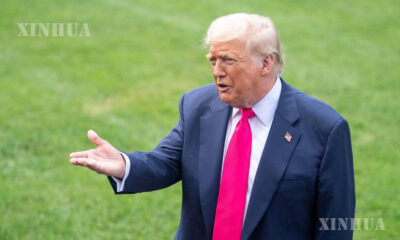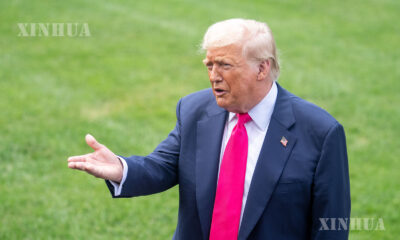North America
“ပြည်သူချင်း ထိတွေ့ဆက်ဆံသည့် သံတမန်နည်းလမ်း” က အမေရိကန်-တရုတ် ကုန်သွယ်မှုဆိုင်ရာ ဆက်ဆံရေးအတွက် အခရာကျဟု အိုင်အိုဝါ တောင်သူများ ရှုမြင်

အတ္တလန်တစ်၊ အမေရိကန်၊ ဇွန် ၉ ရက် (ဆင်ဟွာ)
အိုင်အိုဝါပြည်နယ်မှ ဘေလ် ပဲလက်ထ်ဟု အမည်ရသော တောင်သူလယ်သမားတစ်ဦးမှာ နောင်လာနောက်သားများအတွက် သစ်ကြားသီးပင် ၅၀ စိုက်ပျိုးခဲ့သည်။ ယင်းတို့အနက် ၄၉ ပင်မှာ ကြီးထွားသန်စွမ်းနေပြီဖြစ်ပြီး ၎င်းတို့အား ခူးဆွတ်ရန် သို့မဟုတ် အကျိုးအမြတ်ရရှိရန်အတွက် မဟုတ်ဘဲ လက်ဆင့်ကမ်းအမွေအဖြစ် စိုက်ပျိုးထားခြင်းဖြစ်သည်။
“အဲဒါက သူတို့တွေ ကိုယ်တိုင်လက်တွေ့လုပ်နိုင်ပြီး လက်ဆင့်ကမ်းမျှဝေနိုင်တဲ့ အရာပါပဲ” ဟု ဆင်ဟွာသတင်းဌာနနှင့် မကြာမီက ပြုလုပ်ခဲ့သည့် အင်တာဗျူးတစ်ခု၌ ပဲလက်ထ်က ပြောကြားခဲ့သည်။ “ဒါက မြေယာတွေနဲ့ ကျွန်တော်တို့ ပြန်မရနိုင်တဲ့ အရာတွေကို အလေးအနက်ထားဖို့ သတိပေးနေတဲ့အရာပါပဲ” ဟု ၎င်းက ဆိုသည်။
အိုင်အိုဝါပြည်နယ် အတ္တလန်တစ်မြို့ပြင်နားရှိ အဆိုပါ မြေကွက်၌ ပဲလက်ထ်က မြေဆီလွှာ၊ နေရောင်ခြည်နှင့် ကျေးငှက်တွန်သံများအကြောင်း အလေးအနက် ပြောပြခဲ့သည်။ သို့တိုင်အောင် တည်ငြိမ်အေးချမ်းမှု နောက်ကွယ်တွင် ၎င်း၏အသက်မွေးဝမ်းကျောင်းမှာ ကမ္ဘာ့ကုန်သွယ်ရေး အထူးသဖြင့် အမေရိကန်-တရုတ် ကုန်သွယ်ရေးတင်းမာမှုများ၏ ဂယက်ရိုက်မှုဒဏ်ကို ခံစားနေရသည်။
“တရုတ်နိုင်ငံက ကြီးမားတဲ့ ကုန်သွယ်ဖက်နိုင်ငံတစ်နိုင်ငံပါ” ဟု နွေဦးကာလနှောင်းပိုင်း နေရောင်ခြည်ကို ခပ်မှေးမှေးကြည့်လျက် ၎င်းက ပြောကြားခဲ့သည်။ “ကျွန်တော်တို့က သူတို့ကို ပဲပုပ်၊ အမဲသားနဲ့ ကောက်ပဲသီးနှံတွေ ရောင်းခဲ့တယ်။ ကျွန်တော် အဲဒီကိုရောက်ဖူးတယ်ဗျ။ ကျွန်တော် ဝယ်လက်တွေနဲ့လည်း စကားပြောဖူးတယ်။ မျက်နှာချင်းဆိုင် တွေ့တဲ့အခါ ကျွန်တော်တို့ကြားမှာ သိပ်ပြီးကွာခြားမှုမရှိမှန်း သဘောပေါက်ကြမှာပါ” ဟု ၎င်းက ဆိုသည်။
အမေရိကန်သမ္မတ ဒေါ်နယ်ထရမ့်က ၎င်း၏ပထမသက်တမ်း၌ ကျင့်သုံးခဲ့သည့် တင်းမာသော မဟာဗျူဟာကို ပြန်လည်အသက်သွင်းသည့်အနေဖြင့် ဧပြီလ၌ ကုန်သွယ်ဖက်နိုင်ငံများအပေါ် စည်းကြပ်ခွန် ကောက်ခံမှုအသစ်များ လုပ်ဆောင်ခဲ့ချိန်တွင် ထိုဆက်ဆံရေးမှာ အကြီးအကျယ် စိုးရိမ်စရာဖြစ်လာခဲ့သည်။
စည်းကြပ်ခွန်မူဝါဒက တောင်သူများကို အလျင်စလို ဆုံးဖြတ်ချက်ချလာအောင် မည်သို့တွန်းအားပေးနိုင်သည်ကို ပဲလက်ထ်၏ မြေးဖြစ်သူ အသက် ၂၄ နှစ်အရွယ် ကေးလ်က မျက်ဝါးထင်ထင် ကြုံတွေ့ခဲ့ရသည်။ “ဒီနှစ်တော့ ပြောင်းစိုက်တာက ပိုပြီးအမြတ်များမယ့်ပုံပဲဗျ။ တချို့ဆိုရင် ပဲပုပ်စိုက်ဖို့ ပြင်ဆင်ထားပြီးမှ ပြောင်းဖူးကို ပြောင်းပြီးစိုက်ခဲ့တယ်။ အဲဒါက ကုန်သွယ်ရေးမူဝါဒရဲ့ လက်တွေ့ဆုံးဖြတ်ချက်တွေအပေါ် ချက်ချင်း သက်ရောက်မှုပါပဲ” ဟု ၎င်းက ပြောကြားခဲ့သည်။
မူဝါဒပိုင်း မရေရာမှုများက ရင်းနှီးမြှုပ်နှံမှု စက်ဝန်းအပေါ် မကြာခဏ လွှမ်းမိုးသက်ရောက်နေသည်ကို ၎င်းက စိတ်ပျက်လျက်ရှိသည်။ “ပြန်လည်ပြည့်ဖြိုးမြဲ ဒီဇယ်စက်ရုံတစ်ရုံကို ၁၈ လအတွင်းမှာ တည်ဆောက်လို့ရပါတယ်။ ဒါပေမဲ့ ကုန်သွယ်ရေးစစ်ပွဲက ၁၈ နာရီအတွင်းမှာ ဈေးကွက်တစ်ခုကို ပြိုလဲသွားစေနိုင်တယ်။ အဲဒီကွာဟချက်က ကြောက်စရာကောင်းပြီး လူတွေကို ကစဉ့်ကလျားဖြစ်စေတယ်” ဟု ၎င်းက ဆိုသည်။
ယခင်က တရုတ်နိုင်ငံမှာ အမေရိကန်မှ ပဲပုပ်အများဆုံးဝယ်ယူသည့်နိုင်ငံ ဖြစ်သော်လည်း ယခုအခါ စည်းကြပ်ခွန်နှင့် အခြား အကြောင်းရင်းများကြောင့် ဘရာဇီးနိုင်ငံမှ ပိုမိုတင်သွင်းလျက်ရှိရာ ထိုအပြောင်းအလဲကြောင့် အမေရိကန် တောင်သူများအဖို့ ဒေါ်လာဘီလီယံနှင့်ချီ ဆုံးရှုံးခဲ့ရသလို ၎င်းတို့၏ ကမ္ဘာ့ဈေးကွက်အပေါ် လွှမ်းမိုးနိုင်စွမ်းမှာလည်း ကျဆင်းသွားခဲ့သည်။ (Xinhua)
သတင်းအပြည့်အစုံကို ဖော်ပြပါလင့်ခ်မှတစ်ဆင့် ဝင်ရောက်ဖတ်ရှုနိုင်ပါသည်။ xhtxs.cn/4eV

အမေရိကန်နိုင်ငံ အိုင်အိုဝါပြည်နယ် အတ္တလန်တစ်မြို့တွင် ဆင်ဟွာသတင်းဌာနနှင့် အင်တာဗျူးတစ်ခု၌ ကေးလ်ပဲလက်ထ်အား ၂၀၂၅ ခုနှစ် မေ ၂၂ ရက်၌ တွေ့ရစဉ် (ဆင်ဟွာ)
……………..
(English Version)
Iowa farmers see “person-to-person diplomacy” as key to U.S.-China trade ties
ALTANTIC, United States, June 8 (Xinhua) — Two years ago, Iowa farmer Bill Pellett planted 50 walnut trees for his grandchildren. Today, 49 of them stand strong — not for harvest or profit, but for legacy.
“This is something they can walk through and pass on,” Pellett told Xinhua in a recent interview. “It’s a reminder to take care of the land and the things we can’t get back.”
On this patch of land just outside Atlantic, Iowa, Pellett spoke with reverence about soil, sunlight and birdcalls. But behind the serenity, his livelihood is tethered to global trade, especially the impact of U.S.-China tensions.
“China has been a great partner,” he said, squinting into the late spring sun. “We’ve sold them soybeans, beef, grain. I’ve been there. I’ve talked to consumers. When you meet face to face, you realize we’re not that different.”
That relationship came under stress in April when U.S. President Donald Trump launched a new wave of tariffs on the country’s trade partners, reviving a hardline strategy in his first term.
Pellett’s 24-year-old grandson, Cale, saw firsthand how tariff policy could jolt farmers into quick decisions. “Corn seemed more profitable this year,” he said. “Some folks who were going to plant soybeans switched last-minute to corn. That’s how quickly trade policy affects real decisions.”
He’s frustrated by how policy uncertainty often outpaces investment cycles. “You can build a renewable diesel facility in 18 months,” he said. “But a trade war can kill a market in 18 hours. That mismatch is dangerous. It leaves people scrambling.”
China was once the top buyer of U.S. soybeans. Today, due in part to tariffs, it sources more from Brazil, a shift that has cost U.S. farmers billions and diminished their global market influence. xhtxs.cn/4eV
English Caption 1
Farm owner Bill Pellett watches havested corn loading into a truck in a field of his family farm in Atlantic, a small city in the Midwestern state of Iowa, the United States, Oct. 14, 2019. (Xinhua/Wang Ying)
English Caption 2
Cale Pellett speaks in an interview with Xinhua in Atlantic, Iowa, the United States, on May 22, 2025. (Xinhua/Liu Yanan)






